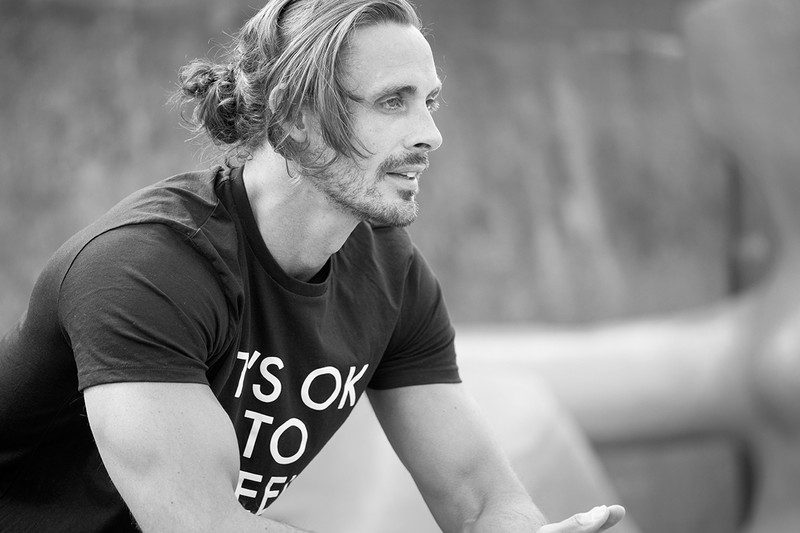Life Lessons With The Naked Professor

Where did your mental health journey start, Ben?
It all started 15 years ago when I was in my mid-20s. Life was going well – I was ticking a lot of society’s boxes. I had a good job and decent career prospects, plenty of friends (and girlfriends) and was going to lots of parties. I couldn’t have asked for much more. But internally there was a sense of emptiness: I was living to conform with what was expected of me; I wasn’t living to my own values. Because at my core I am a sensitive, loving man who doesn’t really care for bravado or being the centre of attention; what I really care about is people, how they feel, being kind to one another and a deeper connection.
I didn’t know it at the time, but your body speaks to you when you are out of alignment like this. For me, I struggled to orgasm. This led me to work with a hypnotherapist who helped me understand who I was. Without sounding dramatic, this changed my life. Soon after, I trained to become a coach myself to help others on their journey. In the last few years, the notion of masculinity has been up for debate and, as a man who has significantly changed myself, I’ve been pulled towards conversations in this area.
What is it about our understanding of ‘masculinity’ that you think needs to change?
For me, society’s idea of being ‘manly’ means we miss out on expressing who we are. Every man (and woman) has the capability to be anything from a soft, gentle person to a tough, aggressive leader and everything in between. Society encourages men to believe we should be strong, tough and unemotional. The reality is, sure, perhaps at times that side of us is required, but we can also be soft, loving, kind and emotional when needed too. I’ve worked with enough men now to know that, however strong and tough they present, underneath all humans there is a loving heart. By denying that heart, we are limiting our experience and repressing our ability to experience deep connection with both ourselves and others. Connection is the most powerful of mental health tools.
Is that notion of being manly now an old-fashioned concept?
Absolutely. My dad was born after the war, at a time when their dads had to strip out their emotions. There wasn’t the freedom to feel low or have bad days when you’re going off to war. There wasn’t access to food like we have now, and there wasn’t a sense of security like we have now – men had to fight hard to create a sense security for themselves and their families. My dad isn’t the most emotional, but I understand why: he learned from his father and he’s doing the best he can with what he saw and experienced growing up, when things were different.
Mental health is discussed a lot in the media now. Why do men still seem to struggle with conversations about their mental health?
This is something I’m still working on myself. Here’s the thing: most of us struggle to sit in a space with someone who says they are struggling or having a bad day. We quickly want to make the conversation positive to make them feel better or even avoid the conversation altogether.
The truth is we all have bad days, so when someone tells me they are struggling, I try to tell them this is normal. I encourage them to understand that one day they may be able to laugh about it, once the heaviness has lifted. I believe we have become too focused on everything needing to be positive and we’ve lost touch with the truth of who we are as human beings. I love a truthful conversation about how someone is feeling way more than I do an inauthentic conversation between two people pretending to be something they aren’t.
What have been the most memorable lessons you’ve learnt doing the podcast?
I’ll never forget sitting in a room with 6’9 rugby player Jim Hamilton. Jim is a beast of a man, an alpha character in many ways. Yet here was a guy who left that side of him behind and just came and shared how he felt because he’s passionate about talking about mental health. It was powerful to share his vulnerability in such a healthy, strong way. It was beautiful and I’ll always be grateful to him for sharing that conversation with us. I also won’t ever forget how many men (and women) experience imposter syndrome, despite how they may appear on the surface. As before, it’s my learning that everyone has it to different degrees.
What are some simple things all men can do to improve their mental health?
It starts with finding the courage to learn to connect and express your emotions. Emotions are like a muscle: the more we use them, the stronger they get. Most of us have buried them and experience a sense of emptiness within, which in turn leads us to go chasing something that makes us feel something – like alcohol, drugs, food, sex and gambling. Find friends who you can talk to and create a space where you allow for real conversation. Try to be receptive, share how you feel and try not to judge or laugh at each other; simply allow yourselves to share whatever emotions are real. This may sound strange and foreign, but doing this can greatly increase connection between people and help you to understand yourself better. This is one of the reasons I created Heart Space, which is a sanctuary for members to learn tools to grow as a person and connect with a community of like-minded people, safe from the noise, judgements and online trolls of open social media platforms.

If you have a friend you think is struggling, how can you help?
Allow space for them to feel whatever it is they are feeling. Don't judge them, or label them for feeling what they feel. Simply allow them space to share and listen. You don’t need to try and fix them or give them advice or to try and make things positive. Just let them share what’s within them. That can start with a simple text or voice note jto say you are wondering how they are getting on, or how they are finding things with so much craziness going on in the world.
Is mindfulness something we should all be prioritising at the moment?
Yes, but the word mindfulness is a hugely confusing term. For starters, mindfulness is mostly about getting out of your mind. It’s about being present, not thinking but simply being alive to your senses in that moment. Being mindful isn’t actually about being ‘mindful’ at all – it’s about being ‘mind empty’.
What about meditation? Is that worth investigating?
The most relatable thing I can say about meditation is that when you close your eyes and sit in silence you have nothing to see or hear. As a result, it’s easier to go inward and connect with the deeper parts of who you are. If you don’t connect with this part of you, you will always feel as though something is missing. However, meditation isn’t something to force, or think about whether you’re doing it right or wrong. It’s giving yourself the space to sit with yourself and feel rather than think. Trust in the process and understand that simply letting go of your thoughts and being present is a healthy exercise that will help you reconnect with who you really are. But it isn’t a quick fix. It’s like going to the gym – consistency will get you real results.
If you’re looking to improve your mental health, are there any resources you recommend?
There’s no one-size-fits-all approach – otherwise there’d be a book we could all read and, bingo, we’d be sorted. Do some shopping around and see whose message resonates with you the most. My podcast, The Naked Professors, approaches the subject of mental health in a relatable way, with conversations with the likes of James Haskell and Jason Fox. Also check out Richie Bostock (aka @TheBreathGuy), who is incredible for breathwork, which is like meditation but on steroids. If you’re looking for a book, I highly recommend the story of a friend of mine. Michael has gone from being a very tough, hardened criminal to a soft family man who has won awards from the police for his transformational work and written an amazing book on his story. If any man wants to know that change is possible, he is a great inspiration.
The Heart Space app is now available on the App Store – new users get two weeks of free access. To find out more about Heart Space and Ben Bidwell, visit HeartSpaceCommunity.app and follow Ben @TheNakedProfessor.
DISCLAIMER: We endeavour to always credit the correct original source of every image we use. If you think a credit may be incorrect, please contact us at [email protected].


